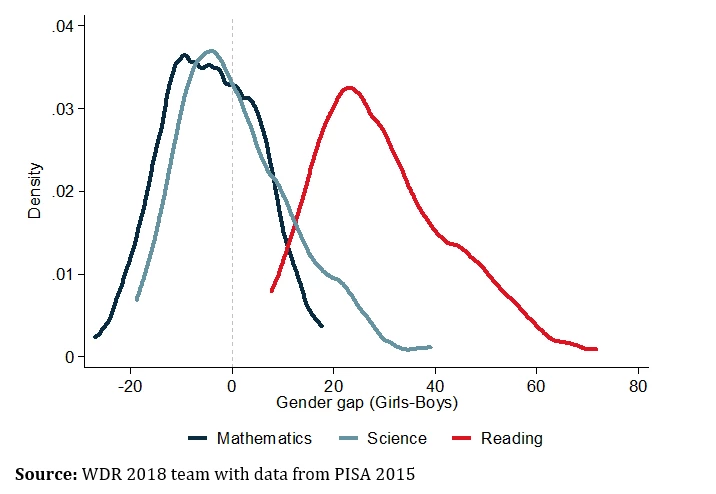Parents are 2.5 times more likely to google “Is my son gifted?” than “Is my daughter gifted?” A gap like this—in perceptions and expectations—is not new. Myths about ‘gendered’ learning gaps have persisted since at least the Victorian era. Could these be true?
Girls outperform boys on test averages
Data from internationally benchmarked tests show that boys lag behind girls on test averages. In all but six of the 72 countries participating in PISA, 15-year-old boys are more likely than girls of the same age to be low-achievers on the composite average of all three subjects tested. Whether on Latin America’s TERCE, the SAT and the NAEP in the United States, or an array of national and regional assessments around the world (here, here, here, and here), girls outperform boys on total test averages in the majority of countries and economic regions.
Behind the averages is a more complex story. Boys’ test scores are much more dispersed (here and here). In fact, boys outscore girls at the top of the distribution, and they underperform at the bottom. Across the OECD countries, 6 out of 10 underachievers—“those who fail to meet the baseline standard of proficiency across the tests”—are boys. Boys are more likely than girls to repeat a grade, less likely to attend college, and less likely to persist in attaining a degree if they do (here and here). Despite this higher performance by women, female college students continue to be under-represented in technical fields like engineering and computer science.
Boys perform marginally better on mathematics and science
This higher average performance by girls masks important variations across individual subjects (as demonstrated in the figure below). While girls consistently score higher in reading and writing across the assessments, boys tend to perform better on assessments in mathematics and science in the majority of countries in which these tests—and others, such as the PASEQ and SACMEQ and the Early Childhood Longitudinal Study—are administered. The Middle East seems to be the only region for which the mathematics advantage for boys does not hold. This male advantage in mathematics is otherwise so pervasive, in fact, that a gender gap is observed even when analyzing the results of twins of different genders in Chile.
Gender-based gaps emerge early on and grow over time
While girls and boys perform at equal levels in both mathematics and reading scores between kindergarten and Grade 2, boys score slightly better in mathematics and worse in reading starting in Grade 3. This subject-specific gender gap continues to grow through elementary and secondary schools (here, here, here, and here).
The mathematics and science gap in favor of boys, however, may be shifting. On the 1995 TIMSS, boys had higher mathematics achievement than girls in all the countries where a gender difference was observed. In science, boys outperformed girls in almost all countries by Grade 8. Results from the 2015 TIMSS assessment were much more mixed. In about half the countries tested, there were no (statistical) differences in gender performance in mathematics and science. Boys, however, still outperformed girls on mathematics and science in the majority of the remaining countries.
A number of biological and socio-cultural causes have been proposed to explain the observed gender-based gaps in learning.
Is it Nature?
Are there gender-based differences in brain structure? Possibly. General intelligence tests suggest that there may be no overall differences between male and female cognitive ability. But there do appear to be gender differences in brain development and competency on specific cognitive tasks. Boys have larger brains, but girls’ brains mature faster. The hippocampus, where memory and language are derived from, develops more rapidly and is larger in girls than in boys. Girls also have more of their cerebral cortex defined for verbal function. This impacts vocabulary, reading, and writing skills. Boys, on the other hand, have more of their cerebral cortex defined for spatial relationships. As a result, they outperform girls at visual-spatial tasks and learn more easily through movement and visual experience. This impacts mathematics skills.
Girls also produce more serotonin and oxytocin, which may make them calmer, more interested in emotional connection, and capable of maintaining focus for longer periods of time. A study found that middle-school girls edge out boys in overall self-discipline. Girls were more adept at “reading test instructions before proceeding to the questions,” “paying attention to a teacher rather than daydreaming,” “choosing homework over TV,” and “persisting on long-term assignments despite boredom and frustration.” These differences in male and female brain structures and in exposure to hormones might influence gender-specific learning advantages (here, here, and here).
Is it Nurture?
Do teachers affect this gender gap? Potentially. Male and female teachers might have unique biases in how they engage boys and girls in the classroom. For example, there is evidence that teachers are more likely to praise comments made by boys but merely acknowledge comments by girls. Similarly, cognitive process theories suggest that teachers may have different academic expectations of boys and girls, and students may be responding to these (a Pygmalion effect). Students may also be responding to a teacher’s gender rather than a teacher’s behavior. For example, students may be more responsive to a same-gender teacher due to role-model effects.
Do societal expectations shape outcomes? Absolutely. Gender-gaps may arise from differences in socially-derived confidence. Commonly held gender beliefs attribute language as a female domain and mathematics as a male one (see also here), and these assumptions seem to define how girls and boys absorb social notions of masculine and feminine behaviors (here and here). As a result, girls tend to have lower confidence in their ability to solve mathematics and science problems and are more likely to express strong feelings of anxiety towards mathematics (here and here). Girls as young as 6 are conditioned to believe that certain activities are “not for them” because they are not smart enough to engage in those activities. This stereotype threat is so pervasive that a study found female subjects underperformed on a math test when told that the test produced gender differences but did not when told the opposite. Even among high-achieving girls, female students reported being less interested in mathematics than their male peers and assumed that they were less competent. These beliefs translate into lower test performance with important repercussions for female participation in STEM advanced courses and careers.
Boys, on the other hand, seem to adopt a concept of masculinity that includes a disregard for authority, a disinterest in academic work, and a tendency towards being disruptive, and they act accordingly for fear of being excluded by male classmates. When comparing students who perform equally well in reading, mathematics, and science on the PISA assessment boys are more likely than girls to report that they had received lower marks in both languages and mathematics classes in school and to have repeated at least one grade before the age of 15.
So are girls smarter than boys? In some ways, yes. But they also lag behind boys on important domains. The crucial questions are: how much of these gender-based gaps are the result of social constructs, and how do we help girls (and boys) break free of these constructs?




Join the Conversation